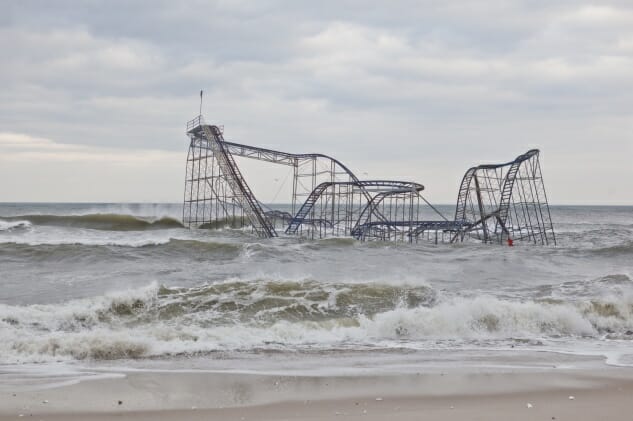
Often, when we talk about climate change, it seems like a far-off scenario. We talk in terms of saving the planet for future generations and predict disruptive sea level rise within the century. But the effects of climate change are already felt around the world; future changes will only intensify them.
![]()
One of the most urgent cases to be made for climate change involve the direct costs it will incur. Think of the damage disasters like Superstorm Sandy and Hurricane Katrina wrought—millions of dollars in reconstruction and lost assets. As storms increase in severity and frequency due to climate change, there is a strong business case to be made for addressing its present and future effects—and limiting emissions as much as possible.
But looking only at the economic costs of property damage and other assets overlooks other serious costs. Environmental change doesn’t just damage buildings and assets; it also worsens health conditions, reduces agricultural output, lowers economic productivity, and affects entire job industries.
These social and human costs of climate change can be difficult to quantify, but they are nonetheless an important part of planning for a warmer globe. Since 2008, the U.S. government has used an estimate of the social cost of climate change in its mitigation and adaptation policies. Although these estimations are an important step forward in planning more realistically for the damages wrought by climate change, some have argued that the numbers used by the government are low-ball estimates that don’t take into account damages that build more rapidly the more changes occur.
“If climate change affects not only a country’s economic output but also its growth, then that has a permanent effect that accumulates over time, leading to a much higher social cost of carbon,” Stanford’s Frances Moore and Delavane Diaz pointed out in 2015. A new report from the National Academy of Sciences echoes such concerns and recommends updating the figures the government uses every five years in order to be as accurate as possible.
 Photo by Tony Hall CC BY-ND 2.0
Photo by Tony Hall CC BY-ND 2.0
Having accurate numbers is important for determining a range of policies, from energy-efficient washing machines and refrigerators to fuel-efficiency and clean-power standards. The current social cost estimates have undergirded 79 regulations in the United States. Michael Greenstone and Cass R. Sunstein argue that the calculation is the “linchpin” of U.S. climate policy.
Creating accurate estimates—and effective laws and regulations to help address these future problems—was a tall order to begin with. But it may prove much more difficult under the new political administration. President Trump’s stance on climate change as a “hoax” is well-known, as is his decision to fill his cabinet with climate-change deniers and avoiders.
Thomas Pyle, who led the Department of Energy transition for the new administration, proposed ending the calculation altogether. Even if a wholesale dismissal of the social costs doesn’t happen, it’s possible anti-science advocates in the Trump administration will lower the number dramatically.
On February 28, the House subcommittees on the environment and oversight held a hearing to examine the social costs of climate change. Yet the discussion devolved into the age-old conservative argument about how much humans affect climate change at all. This hearing echoed another, earlier hearing, hosted by the House Science Committee on the future of EPA, that also devolved into a debate about the effects of climate change and efforts to address them.
Such debates bring the conversation down to a much lower level than we’ve seen in the past nine years. Instead of debating the points brought forth by more recent research and the new National Academy of Sciences report, and then adjusting the calculations and costs accordingly, politicians and officials are undercutting the entire notion that anthropogenic climate change will create any problems at all. In so doing, they will shift these costs onto future generations. And if the United States defers on climate action now, the costs will only multiply; as the old saying goes, a stitch in time saves nine.
“There are obviously political decisions which need to be made in any calculation like the social cost of carbon,” Myles R. Allen, an author of the National Academy of Sciences report, told ProPublica. “On the other hand, the way the climate system responds to greenhouse gas emission levels is not really up for political discussion.”
Top photo by Anthony Quintano CC BY 2.0
Melody Schreiber is a freelance journalist based in Washington, D.C.